#time period: 1940s
Text
Berlin–September, 1945. Two manuscripts are found in rubble, each one narrating conflicting versions of the life of an Irish spy during the war.
One of them is the journal of a German military intelligence officer and an anti-Nazi cowed into silence named Adrian de Groot, charting his relationship with his agent, friend, and sometimes lover, an Irishman named Frank Pike. In De Groot’s narrative, Pike is a charismatic IRA fighter sprung from prison in Spain to assist with the planned German invasion of Britain, but who never gets the chance to consummate his deal with the devil.
Meanwhile, the other manuscript gives a very different account of the Irishman’s doings in the Reich. Assuming the alter ego of the Celtic hero Finn McCool, Pike appears here as the ultimate Allied saboteur. His mission: an assassination campaign of high-ranking Nazi doctors, culminating in the killing of Hitler’s personal physician.
The two manuscripts spiral around each other, leaving only the reader to know the full truth of Pike and De Groot’s relationship, their ultimate loyalties, and their efforts to resist the fascist reality in which they are caught.
#adult books#historical fiction#German rep#closeted rep#gay rep#gay#mlm#mlm rep#Irish rep#assassins#spies#thriller#setting: germany#time period: 1940s#daily book#fiction#lgbt fiction#lgbtqia#bookblr#The Torqued Man#Peter Mann
3 notes
·
View notes
Text
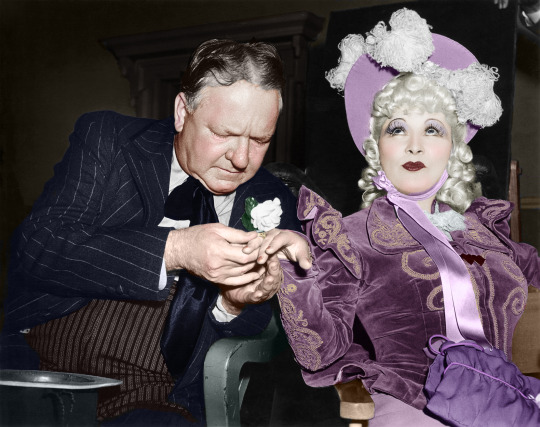

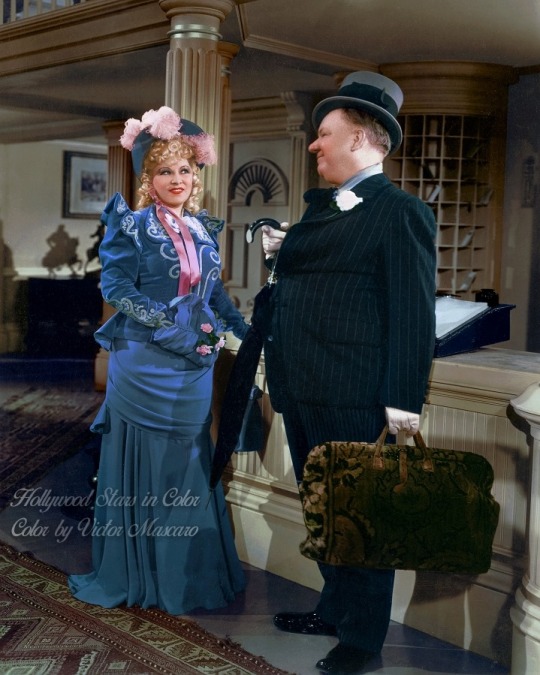
Three different colorization options for Mae West and W.C. Fields in My Little Chickadee (1940).
Do you prefer Mae in purple, red, or blue?
#historical hollywood#old hollywood#classic hollywood#w c fields#mae west#my little chickadee#1940#1940s#classic movies#wild wild westerns#period films#in the good old former time#glorious technicolor#precious in purple#radiant in red#beautiful in blue#fascinating in feathers#hat lady#stunning in stripes#bow ties are cool#in profile#victor mascaro
41 notes
·
View notes
Text
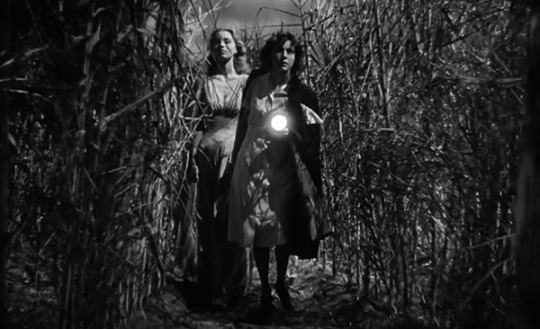
SUMMARY: A nurse is hired to care for the wife of a sugar plantation owner, who has been acting strangely, on a Caribbean island.
#i walked with a zombie (1943)#zombie#1940s#united states#north american movie#mentionable warning#racism#(time-period typical)#horror#movies#poll#more than 50% havent heard
11 notes
·
View notes
Note
catws cap/ws au and/or daemon touch :)
some angsty catws for you anon <3 after mav wakes up from the ice
"Have you heard from Goose? He hasn't written in awhile."
Pete's smile falls, chest throbbing. All these years later, and it still feels like he's lost a limb. He takes a steadying breath; he's done this song and dance before.
"He's doing all right," he lies, doing his best to keep the ache out of his tone. "He and the boys are keeping busy on the front lines. He'll be home before you know it."
Carole smiles, her eyes slipping shut. "Oh, I can't wait to see him again."
Pete's throat is too tight to answer. He squeezes her hand instead. After a moment of quiet, Carole's eyebrows furrow in thought.
"Pete?"
"Yeah?"
"What was that old song he used to sing to me?" she asks, tentative. "I can't…seem to recall. It's right on the tip of my tongue…"
And while Mav's never been much of a singer, he knows which song she means. He can at least do this for her.
"Hold me honey, won't you hold me,
Hold me, never let me go.
Take me honey, won't you take me,
Never to forsake me,
'Cause I love you so…"
#pete maverick mitchell#carole bradshaw#top gun#before anyone asks yes i have an entire playlist of 1920s-1940s songs for this au#I need to organize it; right now it's more 'yeah this could work' or 'they may or may not have been listening to these at this time' or#'this is perfect for the au but doesn't fit the time period'#its a mishmash lmao#i'll organize it eventually#mav and carole#capws au#words from lyss#wips
6 notes
·
View notes
Text
Plssssss WHY WAS EDWIGE SO HOT AGH
#*screeches and bangs head into wall*#sorry i'm tired and gay rn#not apologising actually i take that back#i'm just tired and gay PERIOD#edwige in 1940s was >>>>>> but also her in every decade >>>>>>>#i wanna travel back in time and talk to her so bad
2 notes
·
View notes
Text
Chapter 4 of my post-SoD, semi-historical fiction Fantastic Beasts fic is up, With It’s Head Under One Wing.
Today, Newt puts a former DRCMC colleague in his place, Theseus tries to apologize for a clumsy reaction, and Newt and Theseus discover…autism. Next, we’ll see Newt dealing with a Quentiped, and then a sweet Tina chapter or two before we’re hurtled into the startling appointment of Germany’s new chancellor. (All while Grindelwald is, you know, still somewhere.)
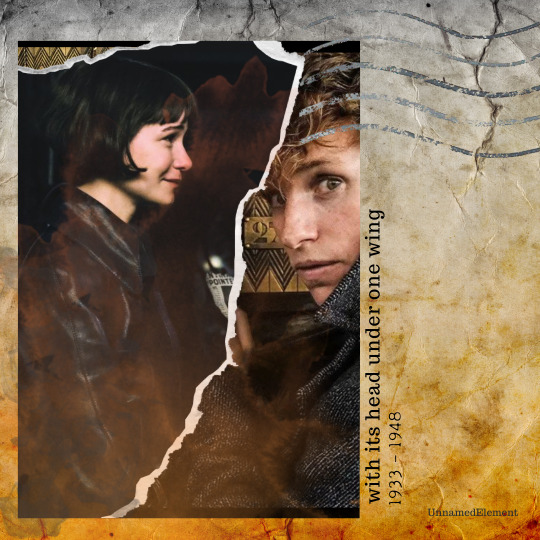
Excerpt:
Newt stood there, processing for a moment, before dropping a hand into the pocket he’d been picking at to play with one of the loose strings inside.
“You came here just to tell me sorry? In person?”
Theseus nodded and shifted slightly on his feet.
“It’s all right. You were very helpful with your information–”
Theseus cut him off. “Newt.”
“It is, though,” he said again. “I did it once, to a hippogriff, when I thought he was – After a storm and he'd been – Well, the details don't matter. But I forgot my manners, despite the hippogriffs’ nature, and we were both quite upset by that in the end."
Theseus looked at Newt for a long moment, and Newt watched Theseus (eyes fixed on the minute crinkles between his brother’s eyes), and then he turned away to retrieve a pair of mugs.
“I forgot that you startle,” Theseus said from behind him. “I’ve accepted that you don’t like to be touched, even if it took me a long time—far too long, really—to stop forcing it on you.”
Newt could hear the unspoken confusion in his brother’s voice.
“At the same time, you’re different than you were when we were kids, you know? More sure. And you handle those beasts like nothing at all.”
Newt cracked his knuckles before unscrewing the lid from the can of Gunpowder tea and—without turning around—he flicked his wand over his shoulder, toward the teapot he kept on the built-in shelf above the sink.
“Newt?”
The teapot floated past Theseus’ head just as Newt turned back around, open can in his hands.
“I have more field data now,” he said simply.
Theseus stared, and then jerkily readjusted so one hand was in his pocket and the other on his hip, leaning slightly forward with furrowed brows as if being closer to Newt would help him better understand the meaning behind his words.
“Field – What?”
#I have really complicated feelings about writing this piece#about writing about a period in history that is so horrific and complex#especially without the lived experience of a Jewish person even though I’ve been researching this era from the time I could read#(bc you know - autism)#but at the same time -#how bizarre to write a story set from the 1920s to 1940s in Europe#without referencing major & building Muggle events#obviously these events exist in JKRs universe bc she talks about WWI in the films & Grindelwald sees flashes of wwii#but whatever#fix it fiction etc etc#even if fixing it means making it infinitely darker?#anyway#fantastic beasts and where to find them#fantastic beasts#newt Scamander#Tina Goldstein#Theseus Scamander#autistic newt scamander#jewish tina goldstein#actually autistic#fanfiction#my stuff#Harry potter#too bad Harry Potter was ghostwritten
9 notes
·
View notes
Photo
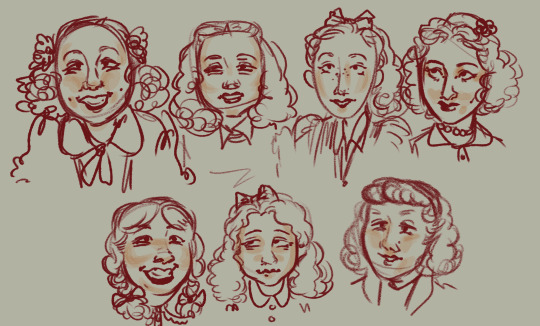
i was looking through some high school year books from the 40s and drew some faces
#original art#1940s#i thought it was just a stylistic choice of the time period but girls REALLY didnt show their ears#i would love to find out why tbh it's an interesting trend#sometimes they did have their ears out when their hair was pulled up but it was very rare
9 notes
·
View notes
Note
Your writing is super good! Have you ever considered writing something with the rest of the Soldiers?
thank you!!
uhh i have an hour-long video on my phone of me describing my pitch (to my best friend) for a reboot/sequel limited series run following the events of sideways’ seven soldiers issues centering on another bout of time displacement that scatters seven people across five time periods after derek and klarion combine unstable dark multiversal energy with chaos magic in order to bring the team from sideways’ run (which is basically morrison’s team i guess) back to the vanishing point. so technically yes
#the time periods are old west/1940s/batman beyond timeline/early modern era batman and robin/robin hood times.#retconned some things in my head (flashpoint brings someone back to life for example and i majorly changed a family bloodline)#also cisco has a cameo in it at the end jhst because. i need him and derek to meet PLEADE. and maybe kiss a little#Anonymous
6 notes
·
View notes
Text
discourse is the mind killer etc
#someone on twt: i hate when ppl use names that don't match the time period no one was named tiffany in the 1940s!!#me: frothing at the mouth trying to restrain myself from roundhousing kicking them in the face with THE NAME TIFFANY LITERALLY GOES BACK#TO THE 12TH CENTURY
1 note
·
View note
Text
Period Dramas, we love them, they test your Knowledge on History and the Romances and Experience brought to life in front of your eyes, they MAY not be real people but it is the Fusion of those before you.
Today I'll be showing part 1 of Period Dramas you should watch, Minor Spoilers ahead tho
-Outlander

Outlander is a very unique Drama, it portrays the Characters from their era where they lived, Claire, the Main Character, is from the 1940s suffering PTSD from WW2 as she firsthand experienced it from being a Combat Nurse.The Fact that she is already scarred tells you about the Age rating of this show.
In some Event, I'm not gonna spoil it, she is Transported back in time to the 1743, in Scotland, where she faces dangers she only read from History Books and Records, none of the Characters are exactly Progressive in the Time Period they lived and that's unique part of it, it doesn't force Progressive themes onto the Characters and actually depict what people like back then.
You can legitimately compare the people from the 1700s to the 1940s to the 1960s.
-Last Madame

Hailing from my Country, Last Madame is a Netflix Series about a Girl who discovers the lives of Women from 1930s Singapore, the setting takes place in a Brothel, as in those times Women who wanted to find a Job and not be forced into marriage could only go to these places, it's a form of Freedom, that most people don't understand these days.
If you're looking for ✨ S t e a m y ✨ Romance, Rivalry and a Looming Threat of a World War 2, here's a Show to Watch.
-Scarlet Heart
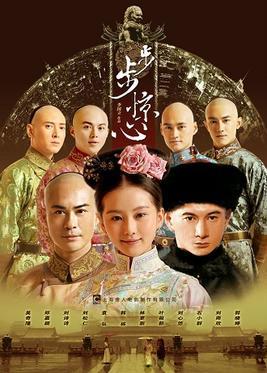
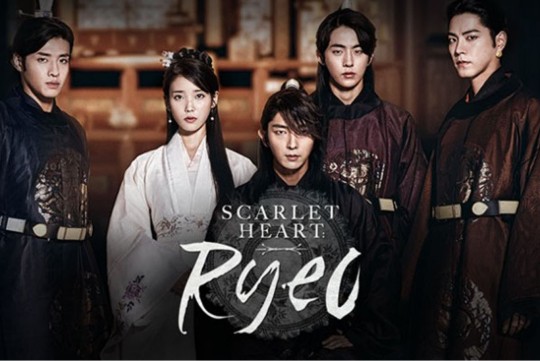
There is the Chinese and the Korean version, each taking place in a different Era, the Chinese one takes place in the Qing Dynasty (1636 to 1912) and the Korean one takes place in the Goryeo Period(918 to 1392), I can say that both installments are Tragic as hell, heartbreaking, Unrequited love stuff if you don't count Chinese version's Modern Day Sequel and Literal Death of Characters.
The Main Character Time Traveled to this Era, so do you want to be Destroyed in and out? This is the right one for you, however Personally I think the two Series happened in the Same Universe for some Reason.
-This Land is Mine
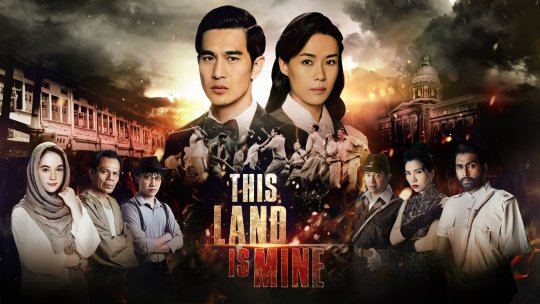
Another Drama that also comes from my Country, it talks about Singapore in the 1950s, still suffering from the effects of WW2, it is apart of History that many Elderly Singaporeans still remember and it horrifies them, It talks about being Racial divide, the idea of Independence, Riots that happened that honestly told Countless stories that many still remember.
It's Available on YouTube and get ready for a Heartwarming Cliffhanger as you realize that the Character's stories are not supposed to be complete because the generation that lived in that time is still existing, it's a Good show.
#period drama#southeast asia#south korea#china#goryeo#qing dynasty#singapore#english#malay#tamil#chinese#manchu#time travel#outlander#scarlet heart ryeo#scarlet heart#this land is mine#last madame#1930s#1940s#1950s#1700s#british colonial period#peranakan representation#georgian era#interwar britain era#time travel drama#WW2 drama#ww2#ww2 films
6 notes
·
View notes
Text
It’s 1942 and Willowjean “Will” Parker is a scrappy circus runaway whose knife-throwing skills have just saved the life of New York’s best, and most unorthodox, private investigator, Lillian Pentecost. When the dapper detective summons Will a few days later, she doesn’t expect to be offered a life-changing proposition: Lillian’s multiple sclerosis means she can’t keep up with her old case load alone, so she wants to hire Will to be her right-hand woman.
Three years later, Will and Lillian are on the Collins case: Abigail Collins was found bludgeoned to death with a crystal ball following a big, boozy Halloween party at her home—her body slumped in the same chair where her steel magnate husband shot himself the year before. With rumors flying that Abigail was bumped off by the vengeful spirit of her husband, the family has tasked the detectives with finding answers where the police have failed.
But that’s easier said than done in a case that involves messages from the dead, a seductive spiritualist, and Becca Collins—the beautiful daughter of the deceased, who Will quickly starts falling for. When Will and Becca’s relationship dances beyond the professional, Will discovers she may have become the murderer’s next target.
#adult books#historical fiction#mystery books#book series#bisexual#bisexual rep#disabled (multiple sclerosis)#disability rep#in uniform#thriller#time period: 1940s#daily book#fiction#lgbt fiction#lgbtqia#bookblr#Fortune Favors the Dead#Stephen Spotswood
4 notes
·
View notes
Text
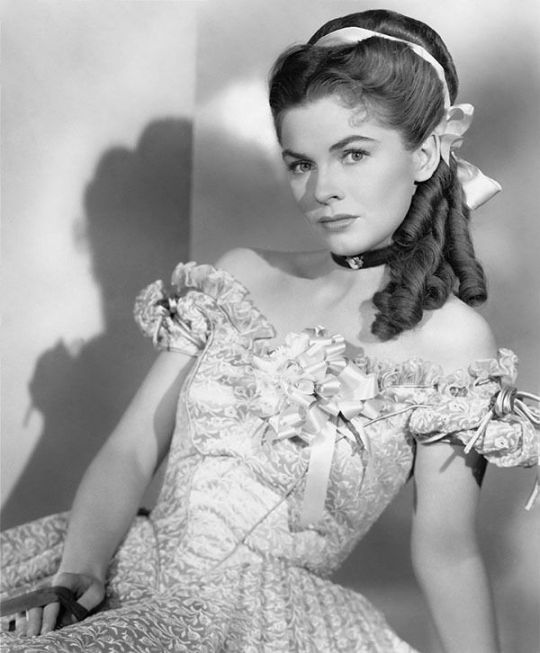
Joanne Dru as Olivia Dandridge in She Wore a Yellow Ribbon (1949)
#historical hollywood#old hollywood#classic hollywood#joanne dru#she wore a yellow ribbon#1949#1940s#promotional photos#period films#wild wild westerns#in the good old former time#ravishing in ruffles#beaming in bows
3 notes
·
View notes
Text
quotes by Victorians about the 1920s view of their generation's women
"We are frequently told that the Victorian woman...generally behaved like a pampered and neurotic infant. This is all moonshine. I do not think that I ever saw a woman faint before I came to London in 1869, and not often after then...they enjoyed a hearty laugh, and a good many of them a contest of wits with any man." -Nineteenth Century, a Monthly Review, 1927 (written by a man born in 1850)
"What queer ideas the girl of 1929 has about the Victorian period- they are not a bit true...Marriage was by no means the end and aim of our existence. Oxford and Cambridge claimed quite a few of us after school days were over. We had great ideas about 'life' and what it all might mean to us." -St. Petersburg Times, 1929 (written by a woman born in 1853)
"True, debutantes were chaperoned at balls. But that fact did not prevent them from dancing as frequently as they chose with their favorite partners. The idea that girls in the Victorian era spent their days sewing seams and practicing scales is another fallacy." -Gettysburg Times, July 1, 1927 (quote from the Dowager Lady Raglan, Ethel Jemima Somerset, who lived from 1857 to 1940)
#history#when they were still alive to defend themselves#maybe- much as I rag on modern historical fiction -we've gotten a bit closer to the truth than our grandparents did#see this is one reason I love studying the Victorian era (besides hoarding their detritus like a dragon I mean what)#it just is One Of The Eras Of All Time in pop culture#and it means so much to so many people that getting to the real human bottom of it fascinates me#spoiler: it boils down to 'people were people and always have been'
10K notes
·
View notes
Text
I Hate How She Talks About Snow White

"People are making these jokes about ours being the PC Snow White, where it's like, yeah, it is − because it needed that. It's an 85-year-old cartoon, and our version is a refreshing story about a young woman who has a function beyond 'Someday My Prince Will Come. "
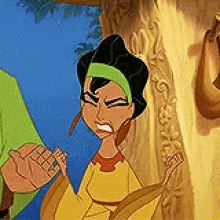
Let me tell you a little something's about that "85-year-old cartoon," miss Zegler.
It was the first-ever cel-animated feature-length full-color film. Ever. Ever. EVER. I'm worried that you're not hearing me. This movie was Disney inventing the modern animated film. Spirited Away, Into the Spider-Verse, Tangled, you don't get to have any of these without Snow White and the Seven Dwarfs (1937.)
Speaking of what you wouldn't get without this movie, it includes anime as a genre. Not just in technique (because again, nobody animated more than shorts before this movie) but in style and story. Anime, as it is now, wouldn't exist without Osamu Tezuka, "The God of Manga," who wouldn't have pioneered anime storytelling in the 1940s without having watched and learned from Snow White and the Seven Dwarfs in the 1930s. No "weeb" culture, no Princess Mononoke, no DragonBall Z, no My Hero Academia, no Demonslayer, and no Naruto without this "85-year-old cartoon."
It was praised, not just for its technical marvels, not just for its synchronized craft of sound and action, but primarily and enduringly because people felt like the characters were real. They felt more like they were watching something true to life than they did watching silent, live-action films with real actors and actresses. They couldn't believe that an animated character could make kids wet their pants as she flees, frightened, through the forest, or grown adults cry with grieving Dwarves. Consistently.
Walt Disney Studios was built on this movie. No no; you're not understanding me. Literally, the studio in Burbank, out of which has come legends of this craft of animated filmmaking, was literally built on the incredible, odds-defying, record-breaking profits of just Snow White and the Seven Dwarfs, specifically.
Speaking of record-breaking profits, this movie is the highest-grossing animated film in history. Still. TO THIS DAY. And it was made during the Great Depression.
In fact, it made four times as much money than any other film, in any other genre, released during that time period. It was actually THE highest-grossing film of all time, in any genre, until nothing less than Gone With the Wind, herself, came along to take the throne.
It was the first-ever animated movie to be selected for the National Film Registry. Actually, it was one of the first movies, period, to ever go into the registry at all. You know what else is in the NFR? The original West Side Story, the remake of which is responsible for Rachel Ziegler's widespread fame.
Walt Disney sacrificed for this movie to be invented. Literally, he took out a mortgage on his house and screened the movie to banks for loans to finish paying for it, because everyone from the media to his own wife and brother told him he was crazy to make this movie. And you want to tell me it's just an 85-year-old cartoon that needs the most meaningless of updates, with your tender 8 years in the business?
Speaking of sacrifice, this movie employed over 750 people, and they worked immeasurable hours of overtime, and invented--literally invented--so many new techniques that are still used in filmmaking today, that Walt Disney, in a move that NO OTHER STUDIO IN HOLLYWOOD was doing in the 30's, put this in the opening credits: "My sincere appreciation to the members of my staff whose loyalty and creative endeavor made possible this production." Not the end credits, like movies love to do today as a virtue-signal. The opening credits.
It's legacy endures. Your little "85-year-old cartoon" sold more than 1 million DVD copies upon re-release. Just on its first day. The Beatles quoted Snow White in one of their songs. Legacy directors call it "the greatest film ever made." Everything from Rolling Stones to the American Film Institute call this move one of the most influential masterpieces of our culture.
This movie doesn't need anything from anybody. This movie is a cultural juggernaut for America. It's a staple in the art of filmmaking--and art, in general. It is the foundation of the Walt Disney Company, of modern children's media in the West, and of modern adaptations of classical fairy tales in the West.
When you think only in the base, low, mean terms of "race" and "progressivism" you start taking things that are actually worlds-away from being in your league to judge, and you relegate them to silly ignorant phrases like "85-year-old cartoon" to explain why what you're doing is somehow better.
Sit down and be humble. Who the heck are you?
#Snow White#Snow White and the seven dwarfs#snow#snow white 1937#snow white and the seven dwarfs 1937#Snow White 2024#Rachel zegler#west side story#poc#Disney#live action Disney hate#animation history#Do not go see this movie. Do not stream this movie.#Anime#anime history
5K notes
·
View notes
Text
Some historical clothing enthusiasts who AREN'T White because I'm sick of seeing White girls in 19th century clothes:
SewRena: specializes in 1950s American sewing & clothing, she is Black
Cosplay Queen: Chinese youtuber who does stuff like makeup, Hanfu of various time periods, Chinese classical dance, & cosplay. Also does a lot of Mukbang vids
MochiHanfu: another Chinese youtuber who specializes in Hanfu
NamiSparrow: Indian cosplayer who has some vids up about historic Indian fashion & sewing
Notyourmommashistory: Black reenactor who does vids on 1800s fashion, slavery in the 1800s, racism, vintage clothing, & also some cool video essays.
Cheon-Shik Yang: he is a Korean tailor who talks about Hanbok & traditional Korean clothing
Fashion & Culture with Kingsley: focuses a bit more on contemporary African clothing & fashions & geared towards fashion designers, but inspired by traditional African designs (from different countries and cultures, such as Ghana, Ethiopia, & Senegal) and clothing & a bit of historic ones as well.
The Couture Courtesan: mixed race Asian reenactor and historical fashion enthusiast who talks about fashions of various time periods, as early as the Tudor era up to the 1910s.
Eccentrik: Jamaican youtuber with vids focusing on fashion, & in particular either vintage fashion (I believe 1940s-60s), pinup fashion & hair & makeup, or vintage inspired sewing
Ora Lin: a nonbinary tailor (who I believe is Asian), they make videos about sewing & historical fashion of different periods & places, including Regency England, Jin & Ming dynasty China, the Edwardian era, & more.
Honorable mention: Snappydragon not a person of color, but she is Jewish & focuses on European historical fashion & Jewish historical fashion (including time periods the Jewish population would not be considered "White")
6K notes
·
View notes
Text
Non-offensive Historical terms for Black people in historical fiction
@pleasespellchimerical asked:
So writing historical fiction, with a white POV character. I'm not sure how to address race in the narration. I do have a Black main character, and I feel like it'd feel out of place to have the narrator refer to her as 'Black', that being a more modern term. Not sure how to do this without dipping into common historical terms that are considered racist today. Thoughts on how to handle this delicately, not pull readers out of the narrative? (fwiw, the POV character has a lot of respect for the Black character. The narration should show this)
There are non-offensive terms you can use, even in historical fiction. We can absolutely refer to Black people without slurs, and if slurs is all one can come up with, it’s time to go back to the drawing board. I cannot say which terms are best for your piece without knowing the time period, but hopefully the list below helps.
Historical terms to use for Black people (non-offensive)
African American documented as early as 1782 (documented in an ad in the Pennsylvania Journal). Note the identity isn’t accurate for non-American Black people.
African could refer to African people or “from 1722 as ‘of or pertaining to black Americans.’”
The place of origin could also be used. For example, “a Nigerian woman”
Africo-American documented as early as 1788.
People of Color documented as early as 1796 (with specific contexts, usually mixed people)
Afro American documented as early as 1817, 1831 (depending on source)
Black American documented as early as 1831
Black was used in Old English to refer to dark-skinned people. Black was not capitalized until recent years, so “She was a young black woman.” would make sense to say, though “She was a young Black woman.” is the better standard today, although not universally adopted. I personally prefer it capitalized.
Moor was used as early as the late 1400s for North African people, but had a somewhat flexible use where anyone visibly Black / Of African descent or the Afro Diaspora might be referred to or assumed as a Moor. Note, it has other meanings too, such as referring to Muslim people, but that doesn’t mean the person using it is going by the dictionary definition. Not really the way to go today, but okay in a historical setting (in my opinion).
Biracial (1860s), mixed race (1872), multiracial (1903) and multicultural (1940s) are also terms to refer to people of two or more races.
Occupation + description. Throughout history, many people have been referred to as their occupation. For example, the Carpenter, The Baker, the Blacksmith. Here’s an example of how you might go about using occupation and traits to identify a Black character in history. Here’s an example I came up with on the fly.
“You should go by Jerry’s. He’s the best blacksmith this town’s ever seen. Ya know, the real tall, dark-skinned, curly haired fellow. Family’s come here from Liberia.”
Offensive and less-sensitive terms for Black people
Blacks was used in plural more, but this is generally offensive today (Even writing it gives me **Thee ick*)
Colored was mostly used post-civil war until the mid 20th century, when it became unacceptable. This is not to be conflated with the South African Coloured ethnic group.
Negro/Negroes were also used as early as the 1550s. Capitalization became common in the early 20th century. I'm sure you know it is offensive today, though, admittedly, was not generally seen as such until around the 1960s, when Black replaced it. It does have its contexts, such as the trope “The Magical Negro” but going around using the term or calling someone that today is a lot different.
Mulatto referred to mixed people, generally Black and white, and is offensive today.
The N-word, in all its forms, is explicitly a slur, and there is absolutely no need to use it, especially in a casual manner, in your story. We’ve written about handling the N-word and alluding to it “if need be” but there are other ways to show racism and tension without dropping the word willy-nilly.
Deciding what to use, a modern perspective
I’m in favor of authors relying on the less offensive, more acceptable terms. Particularly, authors outside of the race. Seldom use the offensive terms except from actual direct quotes.
You do not have to use those offensive terms or could at least avoid using them in excess. I know quite famous stories do, but that doesn’t mean we have to so eagerly go that route today. Honestly, from teachers to school, and fellow non-Black students, it’s the modern day glee that people seem to get when they “get a chance to say it” that makes it worse and also makes me not want to give people the chance.
It goes back to historical accuracy only counting the most for an “authentic experience” when it means being able to use offensive terms or exclude BIPOC from stories. We’ve got to ask ourselves why we want to plaster certain words everywhere for the sake of accuracy when there are other just as accurate, acceptable words to use that hurt less people.
Disclaimer: Opinions may vary on these matters. But just because someone from the group cosigns something by stating they’re not offended by it, doesn’t mean a whole lot of others are okay with it and their perspectives are now invalid! Also, of course, how one handles the use of these words as a Black person has a different connotation and freedom on how they use them.
~Mod Colette
The colonial context
Since no country was mentioned, I’m going to add a bit about the vocabulary surrounding Black people during slavery, especially in the Caribbean. Although, Colette adds, if your Black characters are slaves, this begs the question why we always gotta be slaves.
At the time, there were words used to describe people based on the percentage of Black blood they had. Those are words you may find during your searches but I advise you not to use them. As you will realize if you dive a bit into this system, it looks like a classifying table. At the time, people were trying to lighten their descent and those words were used for some as a sort of rank. Louisiana being French for a time, those expressions were also seen there until the end of the 19th century.
The fractions I use were the number of Black ancestors someone had to have to be called accordingly.
Short-list here :
½ : mûlatre or mulatto
¼ or ⅛ : quarteron or métis (depending on the island, I’m thinking about Saint-Domingue, Martinique and Guadeloupe)
1/16 : mamelouk
¾ : griffe or capre
⅞ : sacatra
In Saint-Domingue, it could go down to 1/64, where people were considered sang-mêlé (mixed blood for literal translation, but “HP and the Half-Blood Prince” is translated “HP et le Prince de Sang-Mêlé” in French, so I guess this is another translation possibility).
-Lydie
Use the 3rd person narrative to your advantage
If you are intent on illustrating historical changes in terminology consider something as simple as showing the contrast between using “black” for first person character narration, but “Black” for 3rd person narrator omniscient.
-Marika
Add a disclaimer
I liked how this was addressed in the new American Girl books
it’s set in Harlem in the 1920’s and there’s a paragraph at the beginning that says “this book uses the common language of the time period and it’s not appropriate to use now”
-SK
More reading:
NYT: Use of ‘African-American’ Dates to Nation’s Early Days
The Etymology dictionary - great resource for historical fiction
Wikipedia: Person of Color
2K notes
·
View notes